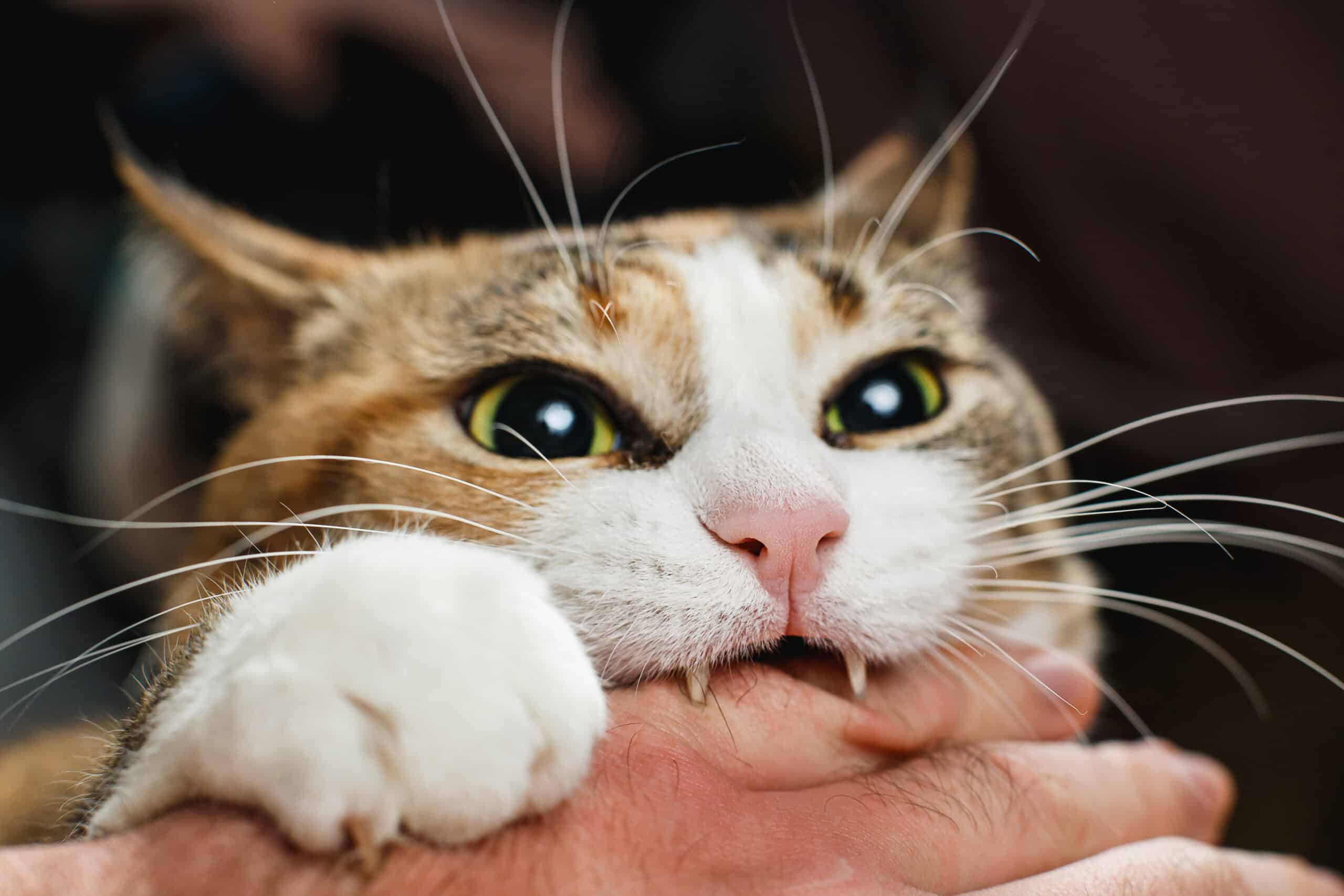It is a myth that cats have “dirtier” mouths than dogs or that they carry more bacteria in their saliva. This misconception probably comes from the fact that cat bites are more likely to become infected. According to the American Academy of Pediatrics, approximately 50% of cat bites lead to infection as opposed to only 10 – 15% of dog bites.
The reason has more to do with the feline anatomy than it does with cleanliness.
Why Do Cat Bites Become Infected So Easily?
Cat bite infection is caused by bacteria in the mouth or saliva of the animal. Wounds — especially puncture wounds —allow bacteria to enter the body.
While dogs have broad, flat teeth perfect for crushing, cats’ teeth are long and sharp for puncturing and shredding. Dog bites may break the skin, but the wounds tend to be shallow. When cats bite, their canine teeth penetrate the flesh leaving small, but deep puncture wounds. These quickly heal over, trapping bacteria under the skin to multiply.
Cat mouths are no “dirtier” than dogs’, but they are home to a particularly pathogenic strain of bacteria known as Pasteurella multocida which thrives in healed-over bite wounds. Without prompt treatment, a serious bacterial skin infection known as cellulitis can take hold within 24 to 48 hours.
What Are The Symptoms Of Cat Bite Infection?
Cellulitis is characterized by redness, swelling and pain at the site of the bite. If left untreated, the bacteria can spread to the bloodstream causing septicemia (blood poisoning) which may be life-threatening. Like the bacteria that causes cat scratch fever, Pasteurella multocida infection results in flu-like symptoms and is most likely to affect children, the elderly, and people with compromised immune systems.
The medical and wellness site, Healthline lists the following specific symptoms of cat bite infection:
- pus or fluid oozing from the wound
- tenderness in areas near the bite
- loss of sensation around the bite
- limited use of the finger or hand if the hand was bitten
- red streaks near the bite
- swollen lymph nodes
- fever or chills
- night sweats
- fatigue
- breathing difficulties
- muscle weakness or tremors
What Should You Do If You Are Bitten By A Cat?
Veterinary Centers of America (VCA) recommend cleaning cat bites “with a mild salt solution made by mixing 1 teaspoon (5 ml) of table salt in 2 cups (500 ml) of water.” They add that you should “avoid scrubbing the wounds vigorously or using strong disinfectants or other chemicals.” This may harm tissue and delay wound healing.
You should always seek medical attention for cat bites that cause puncture wounds. The doctor will likely prescribe antibiotics to reduce the risk of infection, and may also recommend a tetanus booster or rabies vaccine depending on the circumstances of the bite.
How To Prevent Cat Bites:
Cat bites are closely tied to infection, but incidents are relatively rare. In fact, dogs are responsible for 85 – 90% of animal bites in the United States while cats make up only 5 – 10%.
While you are unlikely to suffer a serious cat bite, the consequences can be significant to your health. In order to prevent them, it is important to understand why cats lash out. Most bites occur during play or while you are petting your cat. One moment they are happily enjoying themselves, and the next they are over it!
Aggressive cat bites are less common, but may occur when a cat feels cornered or threatened. Perhaps you are trying to break up a skirmish between two kitties or attempting to corral them for a trip to the vet.
Watch for changes in the cat’s body language. A fearful, defensive or annoyed cat may stiffen up, arch their back, flatten their ears, flick their tail, or even hiss and spit. Give these cats the time and space they need to de-escalate in order to prevent serious bites and scratches.






